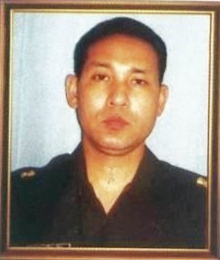Laishram Jyotin Singh
Laishram Jyotin Singh | |
|---|---|
 Portrait of Maj (Dr.) Laishram Jyotin Singh | |
| Born | May 14, 1972 Manipur, India |
| Died | February 26, 2010 (aged 37) Kabul, Afghanistan |
| Allegiance | |
| Service/ | |
| Years of service | 2003-2010 |
| Rank | |
| Service number | MS-14522F (short-service commission)[1] MR-08609M (regular commission) |
| Unit | Army Medical Corps |
| Awards | |
Major Laishram Jyotin Singh, AC was an Officer in the Army Medical Corps of the Indian Army, who died fighting a suicide bomber during the attack on the Indian Embassy in Kabul.[2] Major Singh was awarded the Ashoka Chakra, the highest peacetime gallantry award in the Indian Armed Forces on 26 January, 2011.[3]
Biography[edit]
Singh was born in 1972 in Manipur, India, in a Hindu Meitei family. On 15 February 2003, he was commissioned a captain in the Army Medical Corps on a short-service commission.[1] He was promoted major on 15 February 2007,[4] and with effect from 26 April was appointed to a permanent commission with the rank of major dating from 15 February 2005.[5]
Singh was posted with the Indian Embassy in Kabul in 2010. Just thirteen days after his posting, on 26 February 2010, a suicide bomber attacked the guarded residential compound where he was staying.[6] Major Singh confronted the terrorist unarmed and forced him to detonate his vest, which resulted in his death. He was awarded the Ashok Chakra "For his act of exemplary courage, grit, selflessness and valour in the face of a terrorist attack, resulting in his sacrifice and saving 10 of his colleagues"[7]
References[edit]
- ↑ 1.0 1.1 "Part I-Section 4: Ministry of Defence (Army Branch)" (PDF). The Gazette of India. 10 December 2005. p. 2452.
- ↑ IANS (26 January 2011). "Republic Day: Kabul terror attack hero Major Laishram Jyotin Singh wins Ashok Chakra". Economic Times. Retrieved 26 January 2011.
- ↑ Special Correspondent (26 January 2011). "Major Jyotin Singh awarded Ashok Chakra posthumously". The Hindu. Retrieved 26 January 2011.
- ↑ "Part I-Section 4: Ministry of Defence (Army Branch)" (PDF). The Gazette of India. 8 September 2007. p. 1376.
- ↑ "Part I-Section 4: Ministry of Defence (Army Branch)" (PDF). The Gazette of India. 12 July 2008. p. 858-859.
- ↑ IANS (26 January 2011). "Who is Major Laishram Jyotin Singh?". NDTV India. Retrieved 26 January 2011.
- ↑ "Ashoka Chakra to (Late) Major Laishram Jyotin Singh Two Kirti Chakras (Posthumous) also Awarded". Press Information Bureau, Government of India. Retrieved 26 January 2011.
